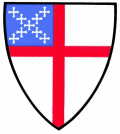Our First Vestry in 1872 and How We Got the Name 'Epiphany'
and John Cullyford being elected as Senior Warden. This optimistic group (known as 'Interested Friends
of the Protestant Episcopal Church in Independence, Kansas', even elected three delegates to the
Diocesan Convention planned for a month later in Topeka, in May. Those three delegates were Eisenberg,
M.D. Henry and George Burchard, who were also elected to the first Vestry.
The rest of the vestry was formed also, and consisted of Frank C. Jocelyn, W. A. McCully, and J.J. Sprague.
Mr. Jocelyn was named clerk pro tem and Mr. Burchard was named clerk. M.L. Robinson was appointed
treasurer. Not only did they talk about building the first church building, they even decided on a name for it:
The Church of the Epiphany. We were named after the Church of the Epiphany in Philadelphia
which dated from the Revolutionary War Days. Fr. Beatty had attended that church and been married there
and he was quite pleased that this little church on the far western prairie should be its namesake.
Many churches are named 'Epiphany' in commemoration of the manifestation of Christ to the Gentiles, but
this particular Church of the Epiphany took a special place in American and Kansas history just before the
Civil War. Although located in Philadelphia -- in the northern part of the USA -- many pro-slavery people
were in the congregation, however the rector, Dudley Tyng was very much an Abolishionist, and he got into
several heated discussions on the slavery issue with members of the congregation and the vestry. One Sunday
morning in 1857, while people all over the USA were discussing and arguing about the plan to force Kansas (the
LeCompton Constitution plan) into the USA as a slave state, Dudley Tyng devoted his entire sermon speaking a
against the idea. In the middle of his sermon, one of the vestrymen there in Philadelphia, Doctor Norris rose from
his seat and began to rebuke Dudley Tyng for 'introducing politics into the services of the church'. This whole
issue caused such a controversy that the vestry decided to ask for Tyng's resignation which was forthcoming
that same day.
At the evening service that same day at Epiphany in Philadephia, Tyng removed himself, along with a large number
of congregants from Epiphany Church. They all went over to Concert Hall and created a new parish known as
Church of the Covenant which coincidentally is how the church in Junction City, Kansas got its name.
Tyng preached constantly against slavery and very much favored having Kansas enter the United States as a
'free-state'. One of his sermons there in his new parish was entitled 'Stand Up For Jesus'. One person in the
congregation for that sermon was George Duffield, Jr. in 1858, who wrote the hymn Stand up, Stand up for Jesus,
Ye Soldiers of the Cross, which was and is usually sung to the tune known as 'Webb'. A person named
Mr. Webb was the organist there at Concert Hall for the Church of the Covenant meetings held by Reverend Tyng.
Fr. Beatty wanted nothing to do with slavery -- which had already been abolished several years prior -- and that
bit of history from the namesake 'Epiphany Church' in Philadelphia plus sweet memories of his own marriage
there by Reverend Tyng also several years before convinced him to use the name 'Epiphany' for the new church
being started here in Independence. Three days later, on April 25, 1872 the new vestry was sufficiently pleased
with Archibald Beatty and his credentials that they met again and asked him to be the Rector at their new church.
So now, you know how we got the name 'Church of the Epiphany'. And perhaps you also notice how squabbles
among Episcopalians is nothing new. Just as we these days have fights over issues like sexuality, in the 1850's
Episcopalians had squabbles over issues like slavery.
PAT





















1 Comments:
Well written Patrick and interesting! I am indeed learning much about our
parish that I knew not of!
Regards, Sorrells
Post a Comment
<< Home